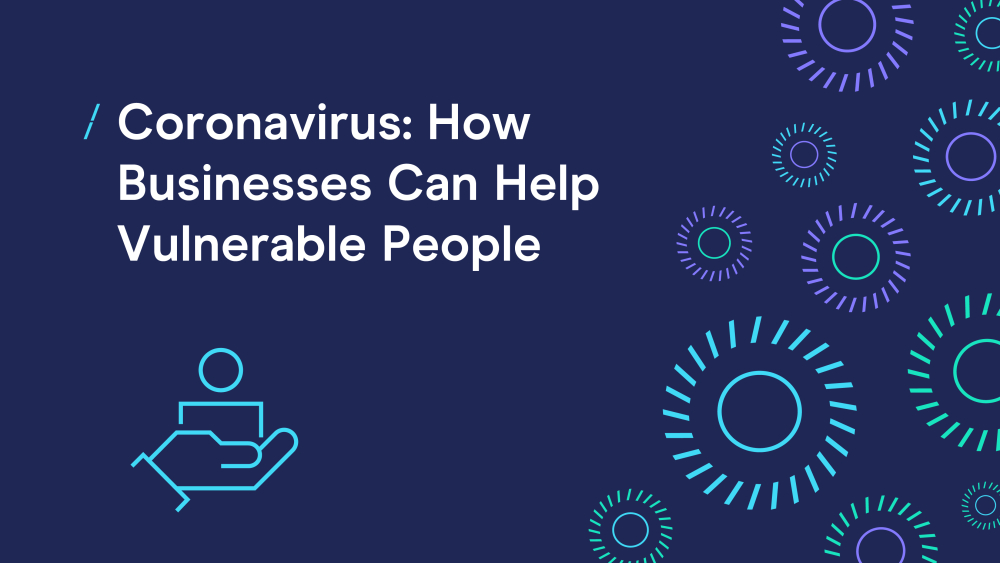Coronavirus: How Businesses Can Help Vulnerable People
22 Apr 2020

As organisations transition to home working the Vulnerable Consumers Working Group looked at what best practices need to be put in place in order to assist those who are vulnerable. Many of these things involve risks that would be negligible in an office environment that now need to be mitigated or are specific needs arising from the current situation.
During these unusual and uncertain times, any one of us may be vulnerable at any time and our increased state of worry with coronavirus.
Best Practice:
Financial services
According to the FCA over 50% of the UK population can’t afford an unexpected bill of £300. Given that your customers may have been furloughed, is a payment freeze a consideration you can offer to support your customers?
What opportunities do you have to provide extra support?
- Extend payment terms without charging interest
- Mobile phone networks granting more data without increasing costs
- Temporarily extending your service offering out to customers at no extra charge
Key workers and those most vulnerable
- Can you identify key workers within your customer base?
- Could you prioritise protecting services for the most affected groups?
Support consumers with marketing messages
Transparent and clear communications can help increase trust, manage expectations, and give supporters more control, as well as lower anxiety and negative impacts.
- Do not guess at the unknowns e.g. if you don’t know how long it will take to send out a parcel, don’t promise what you don’t know
- Be mindful that scammers are also at work, be clear about the things that you will and will never ask your customers to do (e.g. reveal their password or account numbers) and advise them to check any links for spelling mistakes or fraud before submitting personal data
Reviewing business processes
- Be sensitive and mindful about product/service promotions that may cause distress or be completely inappropriate during the pandemic and the lockdown
- Review copy for inappropriate language or references
- Should you be encouraging customers to visit stores right now? Is it necessary?
Receiving responses
Think about how you want customers and supporters to be getting in touch with you and how your staff might handle this
- Consider pushing digital or telephone response rather than a postal
- Stagger campaigns to ease pressure and protect internal staff workloads
- Consider the impact of social distancing on your workforce, can they produce products or answer customer contacts whilst working at a safe distance from their colleagues?
Emergency appeals considerations
- Review how volumes and tone may impact vulnerable customers considering other communications happening around the same time
- Provide messages that give people opportunities to feel empowered
- Share services available, what work is currently being done, etc
- Signpost customers to where they can get help and advice
Marketing
Is your messaging optimal in this environment and what is your due diligence?
- Consider increasing monitoring of agencies to ensure standards remain high during this period of change especially if any payments are being handled by remote workers.
- Remember that the Data Protection Act is still in force during these times
- Monitor feedback on fundraising asks and tailor comms as necessary
- Undertake an audit and risk assessment of automated communications to check messaging
Operational risks
• For tasks that require 2 or more people present, can they work together whilst maintaining a 2m social distance, is it possible for someone to be virtually present?
• Be mindful of the mental health of your colleagues. Can you set up support mechanisms to allow them to have continued contact with co-workers through technology?
• Challenging conversations needing to be dealt with, so how can these be supported?
• Community groups that would work with vulnerable consumers struggling to engage now
Managing volunteers
- Teams working remotely need to be kept up to date. Out of date information is dangerous.
- Business processes that have not been reviewed may inadvertently put consumers at risk – e.g. asking a customer to go into a bank branch – whilst it may be possible it’s not essential
Scams and profiteering
- There is a notable increase in scams and unethical profiteering, most notably via email. Any one of us may be vulnerable at any time and our increased state of worry due to coronavirus can affect our normal decision-making processes.
- We have all become more susceptible to harm and fraud and this is likely to continue for some time.
Fact checking
- Whilst the main news channels are full of coverage, we also need to recognise that the younger generations consume their news in different ways to older generations
- News is consumed online via social channels where there’s no filter for truth and so inaccurate or false information is circulating freely
To find out more about the Vulnerable Consumer Working Group, click here.
For more Coronavirus advice, guidance and help from the DMA, click here.

Please login to comment.
Comments